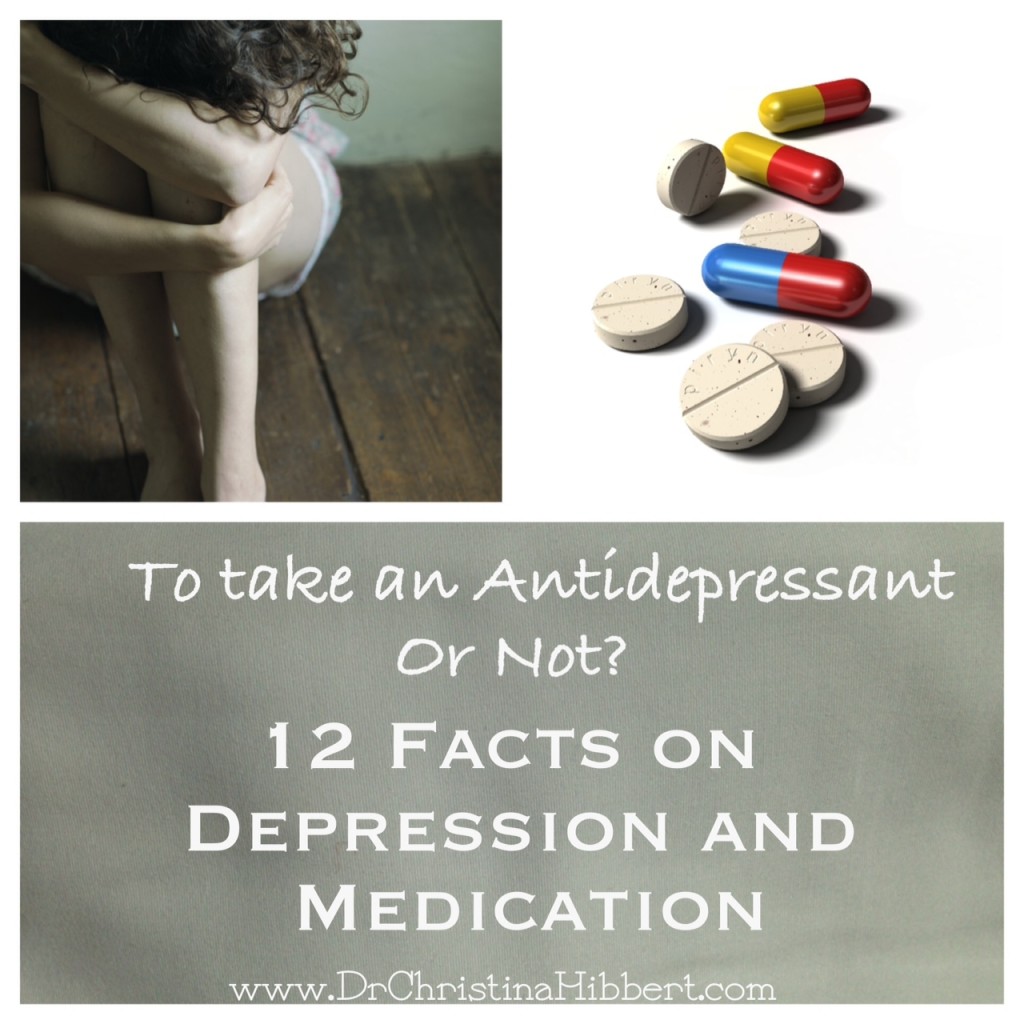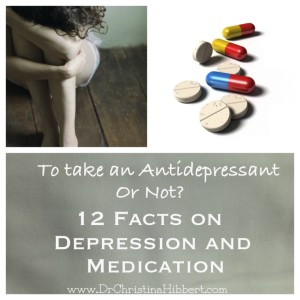
26 Oct Antidepressant? Or Not? 12 Facts on Depression & Medication
As I often tell clients who are depressed or anxious and considering taking a psychotropic medication, “When you need it, you need it.” What I mean is, if medication is one of the tools that will help you feel well again, it’s definitely worth considering.
But considering taking a medication can be tough for many people. Though I don’t prescribe medications (I’m a psychologist, not a psychiatrist), I am often the one helping clients decide what to do about taking an antidepressant, antianxiety, or other type of psychotropic medication. Here are a few of the things my clients and I discuss, in order to make their decision about medication a little easier. I hope they might shed a little light on depression and medication for you too.
The Facts on Depression and Medication
How Medication Works:
1) Life stress and hormones literally alter brain chemistry and can leave us depleted of the neurotransmitters (like Seratonin) that make us feel “normal” and well. When these chemicals are out of whack, we end up with symptoms like sadness, fatigue, anxiety, panic—symptoms of depression, anxiety or other mental disorders. (For more on this, read my Women’s Emotions series.)
2) Take depression, for example. Even people who aren’t struggling with depression have their daily ups and downs. It works the same for those who are depressed, except the lows are much lower and the “highs” are not so high. This is why depression can make it so challenging just to have a normal day.
3) Antidepressants work to correct flaws in the brain’s chemistry, bringing functioning up to a more “normal” level.
4) Antidepressants are not “happy pills,” as many people believe. They don’t alter who you are or affect your personality directly. They simply bring you from here ___ to here —. Then you do the rest.
5) Therapy also works to correct the chemistry of the brain, but it can take 12 weeks, on average, to really see change, whereas antidepressants usually kick in within about 2 weeks to one month, depending on the type. In cases of moderate to severe depression, therapy alone often doesn’t work, because the client doesn’t have the energy or ability to fully participate. Considering how much energy it takes for a depressed person to just get through the day, there is often nothing left for actually working on the depression. This is why antidepressants and therapy work so well together. The medication gives just enough of a boost that you can focus on making change in your life—learning to cope, learning strategies to prevent depression in the future, and eventually, learning how to create the experiences you desire in your life.
6) Because of this, according to research, the “gold standard” of care for depression (for most people) is a combination of therapy and medication.
7) For moderate to severe depression, antidepressants can make the difference between a lengthy battle that seems to never end and a smooth recovery to previous functioning.
Tips on Taking Psychotropic Medications:
8) If you’re considering taking a psychotropic medication, like an antidepressant, antianxiety, or other type, please speak to your doctor and make sure your s/he understands these medications. Many people turn to their primary care physician for mental health medications. Some of these doctors are well educated on psychotropic medications. Others are not. Make sure your doctor understands your needs and offers the education, advice, and support you need.
9) It’s okay, and even recommended, to seek a second opinion or get evaluated by a psychiatrist (a doctor who specializes in psychotropic medications) if you’re not comfortable with what your doctor recommends. This is especially important if your symptoms are more complex or it’s your first time receiving a diagnosis and medication.
10) Just remember, it takes a few weeks for most psychotropic medications to work correctly. It’s not always easy to find the medication that will be just right for you, so be patient. It’s not an exact science—more like trial and error.
11) There can be side effects to antidepressants and psychotropic medications, so make sure you ask your doctor about them and become educated before you start.
12) Most importantly, never “quit” antidepressants or other psychotropic medications, cold turkey. These need to be tapered off over several weeks in order to avoid negative side effects or the resurgence of your previous condition. Please speak with your physician about a tapering plan when you feel ready to come off the medication and heed their advice.
A Few More Things to know about Depression & Medication:
Not everyone needs a psychotropic medication, and I usually recommend trying therapy or alternative methods first, IF it’s okay with your doctor and your symptoms are not severe. In fact, research shows therapy should be considered a first line of treatment for most cases of mild to moderate depression.[1]
That being said, I repeat, “When you need it, you need it.” If your efforts in therapy or other forms of treatment don’t seem to be working, or if you are getting worse, it may be time to look into a medication. It’s one of many tools created to help you be well, and it may just be the one tool that makes the difference for you.
**The opinions presented here are not meant to replace proper medical care but are merely suggestions based on my work as a psychologist. I am not a psychiatrist, nor do I prescribe medications. For information on your own medication treatment or management, please speak to your physician.**
[author] [author_image timthumb=’on’]http://www.drchristinahibbert.com/wp-content/uploads/2012/03/square-head-shot1.jpg[/author_image] [author_info]Clinical Psychologist, Mom of 6, Postpartum Couples DVD Producer, Non-Profit Founder, and expert on Parenting, Women’s Emotions, Pregnancy & Postpartum, and Grief & Loss, Dr. Christina Hibbert loves songwriting, learning, and teaching what she learns. Learn and Grow with Dr. Hibbert and her community of really great people![/author_info] [/author]
Be sure to check out my new book, This is How We Grow, available Nov 2013!
SUBSCRIBE, below, for updates and giveaways!
Has a medication helped you? If so, tell us about it. What helped you make your decision about taking an antidepressant or not? What kinds of things might get in your way? Share a COMMENT, below, and help us de-stigmatize depression and medications!
Don’t miss a thing! SUBSCRIBE (below) and please “Like” my Facebook page or follow me on Twitter, Pinterest, or Instagram, for discussion and inspiration on the topics that matter to you!
[subscribe2]
[1] Stuart, S., O’Hara, M.W., & Gorman, L.L, 2003. The prevention and psychotherapeutic treatment of postpartum depression. Archives of Women’s Mental Health, 6[Suppl.2]: s57-s69.)


Great suggestions. Thanks for providing more insights about medication such as antidepressants. I look forward to hearing more about the effects of certain mediation.
You’re welcome! If I do a follow up post, I will let you know, for sure.:)